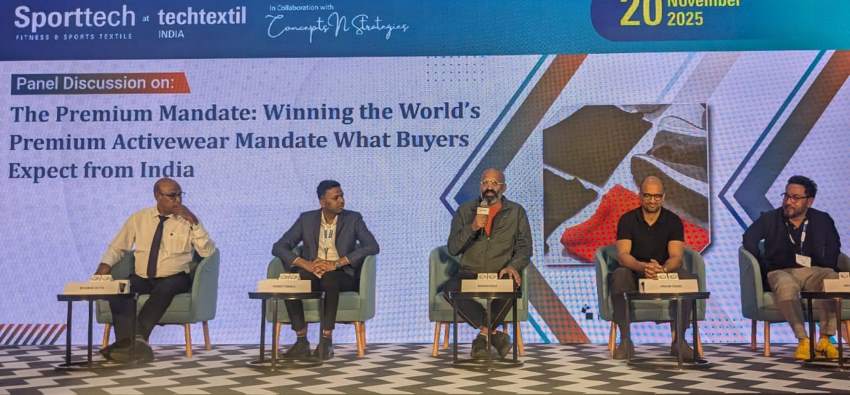"Numerous speeches and discussions enabled audiences to gain valuable perspective and insight on issues related to sustainability and more. Eco-pioneer Stella McCartney spoke about her own journey towards developing an eco-friendly approach, emphasizing the lack of support from the rest of the industry. Entrepreneur and academician David Roberts explained technologies do not disappear but are replaced. Like in the case of oil, competition from solar and wind power could well herald a decline in usage of this resource. "It’s good news. But what's less good news for you is that the textile industry will soon be the most polluting industry in the world, because at the moment you don't have solar power."
 Held over two days May 15 and 16, 2018 in Copenhagen, the sixth edition of the Copenhagen Fashion Summit, discussed innovative industry solutions and ecological and social challenges. The event, organized by the Global Fashion Agenda, was supported by top stakeholders in the global fashion industry including H&M, Nice, C&A and Li &Fung with representatives from unions, associations and other institutions, as well as founders of much smaller brands marking their presence.
Held over two days May 15 and 16, 2018 in Copenhagen, the sixth edition of the Copenhagen Fashion Summit, discussed innovative industry solutions and ecological and social challenges. The event, organized by the Global Fashion Agenda, was supported by top stakeholders in the global fashion industry including H&M, Nice, C&A and Li &Fung with representatives from unions, associations and other institutions, as well as founders of much smaller brands marking their presence.
An eco-friendly approach to fashion
Numerous speeches and discussions enabled audiences to gain valuable perspective and insight on issues related to sustainability and more. Eco-pioneer Stella McCartney spoke about her own journey towards developing an eco-friendly approach, emphasizing the lack of support from the rest of the industry. Entrepreneur and academician David Roberts explained technologies do not disappear but are replaced. Like in the case of oil, competition from solar and wind power could well herald a decline in usage of this resource. "It’s good news. But what's less good news for you is that the textile industry will soon be the most polluting industry in the world, because at the moment you don't have solar power. “
Ellen MacArthur's ‘Make Fashion Circular’ initiative, which aims to establish practices that would develop a truly circular economy in the fashion industry, is attracting an increasing number of brands and manufacturers. The sailor's determination has helped her get more than 50 brands on board, including important ones like Burberry, Nike and H&M. She goes on to say that the biggest players in the plastic industry have worked together to find a solution for packaging. That helped with regulation.
is attracting an increasing number of brands and manufacturers. The sailor's determination has helped her get more than 50 brands on board, including important ones like Burberry, Nike and H&M. She goes on to say that the biggest players in the plastic industry have worked together to find a solution for packaging. That helped with regulation.
Towards atomization
Progress in automation and IT systems have allowed the industry to develop faster solutions which better meet the expectations of final consumers, while also reducing unsold merchandise. Pete Santora of Sofwear Automation has developed a machine which optimizes the processes of cutting, sewing and assembling apparel and footwear. He plans to develop local distribution circuits with factories that are geographically close to their customers.
Adopting responsible strategies
Responsible business strategies are also being developed in China, where consumers are increasingly confronted with problems linked to pollution. As Robby Gu, Vice President-Innovation, JNBY Group points out developing responsible collections is not only about social engagement: it's an economic benefit for them. He said they came up against the problem of other companies copying their products. But by developing responsible sourcing and using quality materials, they ensured customers can tell the difference because of the feel and smell of the brand’s products.
This is one of the central ideas of the summit. All speakers admitted that adopting a responsible approach can imply costs and that it is often complicated for small or medium-sized businesses to know how to get started. But in the mid to long term, these commitments pay off, with 1-2 per cent growth in EBIT margin predicted for companies that make them.
Marie-Claire Daveu, Chief Sustainability Officer, Kering observed during a panel discussing the #Metoo movement and its impact on the industry, “When I think about the road we've travelled since last September in terms of protecting models during Fashion Weeks, it's impressive.” She goes on to say, "There are very few issues to which LVMH and Kering will both put their names to. But when it's about a subject of that scale, the change is radical." Now it's up to the industry to show that this kind of drastic change can also happen in environmental and social issues.












